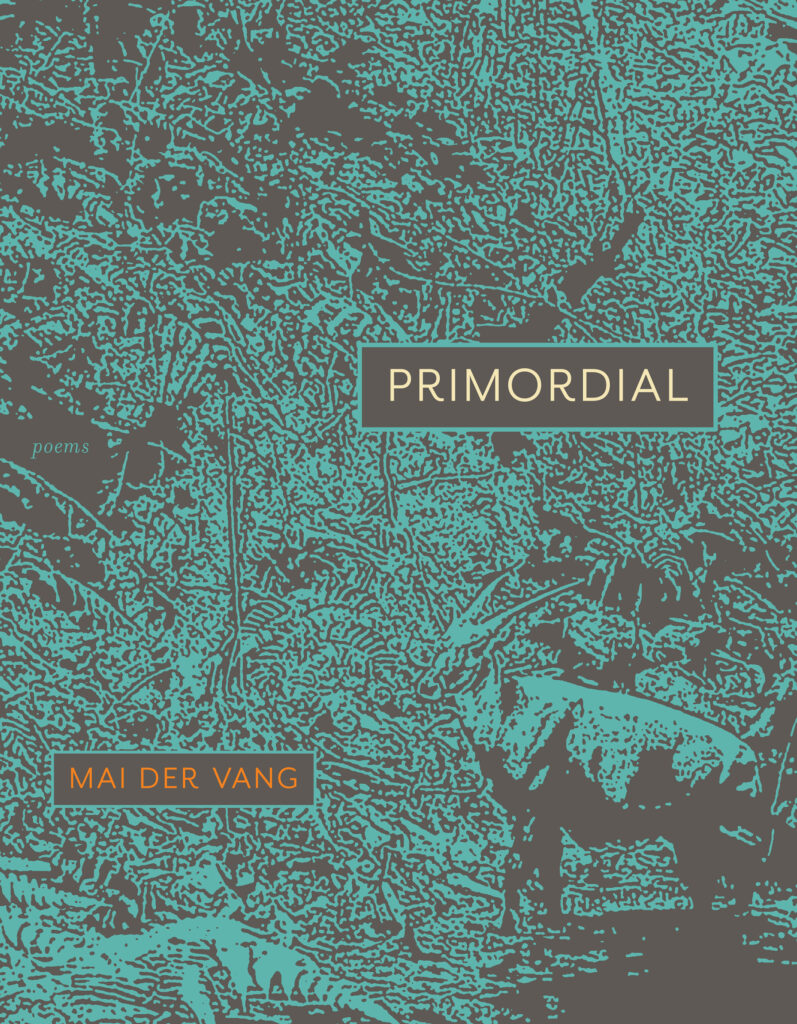
Text
Name
About PRIMORDIAL
Mai Der Vang’s poetry—lyrically insistent and visually compelling—constitutes a groundbreaking investigation into the collective trauma and resilience experienced by Hmong people and communities, the ongoing cultural and environmental repercussions of the war in Vietnam, the lives of refugees afterward, and the postmemory carried by their descendants. Primordial is a crucial turn to the ecological and generational impact of violence, a powerful and rousing meditation on climate, origin, and fate.
With profound and attentive care, Vang addresses the plight of the saola, an extremely rare and critically endangered animal native to the Annamite Mountains in Laos and Vietnam. The saola looks like an antelope, with two long horns, and is related to wild cattle, though the saola has been placed in a genus of its own. Remarkably, the saola has only been known to the outside world since 1992, and sightings are so rare that it has now been more than a decade since the last known image of one was captured in a camera trap photo in 2013.
Primordial examines the saola’s relationship to Hmong refugee identity and cosmology and a shared sense of exile, precarity, privacy, and survival. Can a war-torn landscape and memory provide sanctuary, and what are the consequences for our climate, our origins, our ability to belong to a homeland? Written during a difficult pregnancy and postpartum period, Vang’s poems are urgent stays against extinction.
Reviews PRIMORDIAL
Arriving four years after her much-lauded Yellow Rain, Mai Der Vang’s Primordial (Graywolf, March 2025) is a visually expansive and linguistically captivating collection. Among its various poetic refrains is an examination of the long-term impact of violence on the Hmong people of Vietnam as well as the environmental consequences for the saola, an extremely endangered mammal of the region. Vang’s exquisitely layered contemplations of existence, extinction, location, memory and identity can’t be distilled to one paragraph, nor will one be satisfied by a single reading of this highly anticipated collection.
— Mandana Chaffa, Chicago Review of Books
Three years ago, Mai Der Vang’s Yellow Rain, an expansive performance of documentary poetics grounded in the materiality of collaged archival documents, was a finalist for the Pulitzer Prize. She returns this March with a more contained third collection, Primordial, which also centers ongoing ramifications of the Vietnam war, and the submersion of truths, on Hmong people. Here, her focus turns to the saola, an elusive endangered animal sometimes referred to as the “asian unicorn” of Laos and Vietnam. Metaphor? Scientific evidence? Embodiment of the persistence of a people? The saola morphs in purpose and presence across these poems, as Mai Der Vang continues to forge an ecopoetics that embodies intricate intersections of war, colonialism, environment, and refuge. “Evolution/Absence” weaves statements such as “Hmong people exist/ I am a Hmong person who exists” and “The saola is a secret/ The saola exists.” These are poems of survival.
—Rebecca Morgan Frank, Lit Hub
Blurbs PRIMORDIAL
“A testament to the interconnectedness of life across species and generations, and to the power of spirit, Mai Der Vang’s Primordial adapts the lyricism of her first book, Afterland, and the documentarian gaze of her previous book, Yellow Rain, to poetically present that which binds. Relational, vulnerable, and elegantly woven, Vang’s poems animate the endangered saola alongside the resilience of the Hmong people, juxtaposing the origins of life with the legacies we leave behind. In its honoring of the vulnerability and strength of motherhood, this book is a reminder that our survival is intertwined with the natural world at large, and a call to protect both.”
—Hoa Nguyen
“There’s a way to set a line to remind a reader: poetry is incantation’s medium. Mai Der Vang’s Primordial, then, is a deep spell compendium composed of insistent repetition near graven in its gravity. As magic, her poems seek to order reality, diagrammatic maps of the material world (bodies, earth, boulders, sparrows, placentas, eggs, swords) suspend in primordial whitespace. As magic, her poems seek to transmute, lexical weight becomes the airy syntax of “how do politicians away” and stanza turns photograph. As magic, her poems seek to protect: here the saola, endangered ungulate hunted, haunted out the forests of Laos and Vietnam; here the Hmong, a people obscured by way of colonizing study and U.S. military operations. In Primordial, Vang makes smoke out of LIGHT, planets with LANGUAGE, existence against erasure, and names from secrets, which is to say: this is remarkable poetry set to transfix.”
—Douglas Kearney